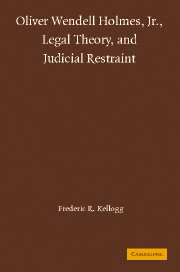Book contents
- Frontmatter
- Contents
- Preface
- 1 A Time for Law
- 2 Playing King: Connections and Misconceptions
- 3 Holmes's Conception of Law
- 4 Common Law Theory Revisited
- 5 Holmes and Legal Classification
- 6 The General Theory of Liability
- 7 Morals and Skepticism in Law
- 8 Judges, Principles, and Policy
- 9 Common Law Constitutionalism
- 10 Holmes's Theory in Retrospect
- 11 Conclusion
- Appendix
- Bibliography
- Index
6 - The General Theory of Liability
Published online by Cambridge University Press: 24 July 2009
- Frontmatter
- Contents
- Preface
- 1 A Time for Law
- 2 Playing King: Connections and Misconceptions
- 3 Holmes's Conception of Law
- 4 Common Law Theory Revisited
- 5 Holmes and Legal Classification
- 6 The General Theory of Liability
- 7 Morals and Skepticism in Law
- 8 Judges, Principles, and Policy
- 9 Common Law Constitutionalism
- 10 Holmes's Theory in Retrospect
- 11 Conclusion
- Appendix
- Bibliography
- Index
Summary
If, within the bounds which I have set myself, any one should feel inclined to reproach me for a want of greater detail, I can only quote the words of Lehuerou, “Nous faisons une theorie et non un specilege.”
O. W. Holmes, conclusion of Preface to The Common Law (1881)Holmes must be one of the very few theorists of modern times who have argued for a general theory of liability embracing both the criminal and the civil law, and the contemporary English lawyer is certain to be deeply suspicious of his suggestion that “the general principles of criminal and civil liability are the same.”
P. S. Atiyah, 1981 Holmes Lecturer at Harvard Law SchoolThese two brief remarks, by Holmes and the British legal scholar P. S. Atiyah, separated by a century, bracket the transit of what may be called Holmes's general theory, the historical hypothesis that he wedded to his common law conception after an absorbing period of work in the years 1873–76.
Holmes had joined George Shattuck and William Adams Munroe in a full-time Boston law practice, and pursued his research at night and on weekends. The intensity of effort, leading to eventual publication of The Common Law in 1881, is reflected in letters and later remarks. By 1881 Holmes's intellectual path had gone from critique to construction – toward “une theorie et non un specilege” – but long before its hundredth anniversary the theory had fallen prey to the “deep suspicion” of which Professor Atiyah would speak in his 1981 Holmes Lecture.
- Type
- Chapter
- Information
- Publisher: Cambridge University PressPrint publication year: 2006



